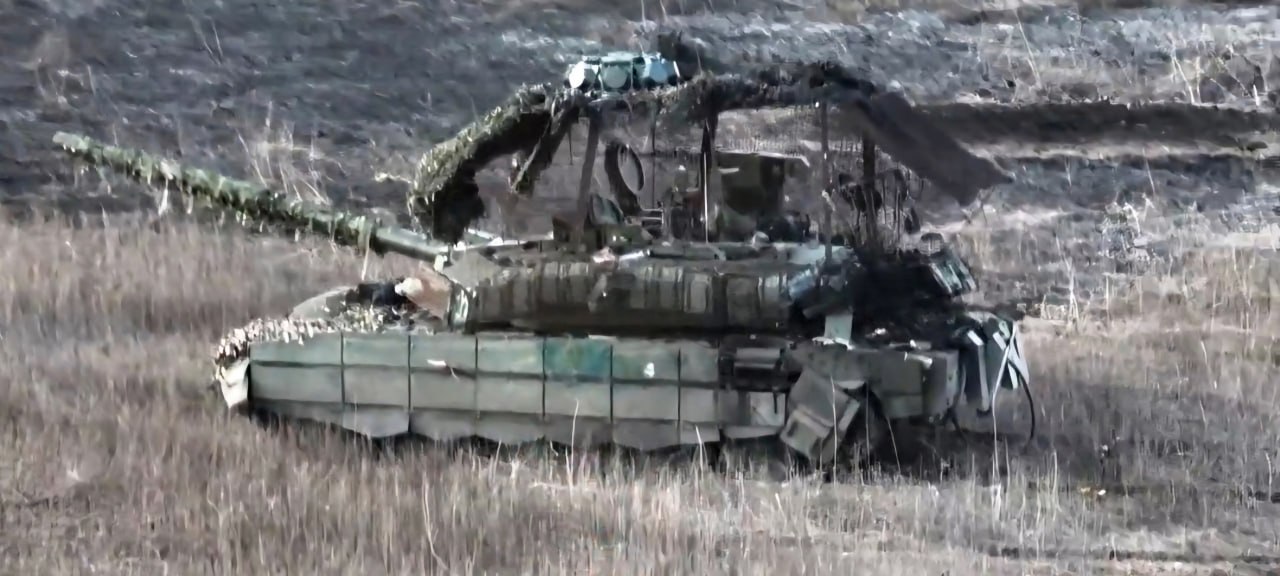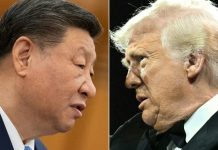A Russian tank platoon commander, identified by the call sign “Chizh,” has claimed that the T-90M “Proryv” tank withstood multiple hits from anti-tank guided missiles (ATGMs) during combat operations in Ukraine.
The commander shared his experience, highlighting the tank’s resilience in the face of heavy fire, according to the state-owned media outlet TASS.
According to Chizh, the T-90M came under attack from four anti-tank missiles but managed to survive the barrage without being destroyed.
“We had to endure four ATGMs hitting us. The MBT withstood it completely,” he said.
He also added that despite taking major damage, the tank and its crew were able to return to combat. “There were a lot of things, but the vehicle holds,” he said
The Russian Defense Ministry reported that the tank crew successfully destroyed a group of Ukrainian soldiers who were obstructing Russian assault units in the Avdiivka direction.
The Russian Defense Ministry detailed that upon reaching a prepared firing position, the T-90M crew efficiently targeted and struck their enemies using high-explosive fragmentation shells of 125 mm caliber.
This tactical maneuver allowed them to remain undetected by aerial reconnaissance and counter-battery fire, showcasing the operational advantages of semi-direct fire methods.
This is not the first time the Kremlin has lauded the T-90M’s capabilities. In June, Russian President Vladimir Putin proclaimed it to be the “world’s best main battle tank,” supported by anecdotes of its resilience in combat.
He shared a story where a T-90 tank survived a roadside bomb detonation, stating that the crew member inside sustained injuries not from the blast but from the jolt of the vehicle. “The tank remained intact,” he noted.
The T-90M is distinguished by its advanced frontal armor, which combines metal, ceramics, and composite materials and offers protection equivalent to over three feet of steel.
Additionally, the latest versions of the T-90M are reportedly outfitted with the Arena active protection system, designed to intercept threats like drones, although its deployment remains unverified in the field.
Tank crews have also taken measures to bolster their defenses. The upper surface of the T-90M is armored by blocks of explosive Reactive Armor (ERA). This system disrupts shaped-charge warheads, especially against aerial attacks.
Russian tanks were also observed with improvised roof screens to shield against overhead assaults, and newer models have been enhanced with ERA-covered screens for increased protection.
The latest iterations of the T-90M feature a comprehensive defense setup. They showcase a roof screen layered with ERA and additional shielding, creating a formidable triple-layer defense.

T-90 Tank Struggles In Ongoing Ukraine Conflict
The T-90M, once praised by Russian President Vladimir Putin as “the best tank in the world,” has seen its reputation somewhat damaged during the ongoing conflict in Ukraine.
According to the open-source investigative project Oryx, more than 150 T-90 tanks have been destroyed, damaged, abandoned, or captured on Ukrainian battlefields.
Though not Russia’s most elite tank, the T-90M is the most advanced model currently deployed in Ukraine. The T-14 Armata holds the title of Russia’s most advanced tank, but with only about 20 units in existence, it has not been directly used in the conflict.
Introduced in 1992, the T-90 has undergone several upgrades, with the T-90M, its fourth iteration, entering service in 2019. Weapons expert Martin J. Dougherty noted that the T-90 essentially combines the reliable chassis of the T-72 with the advanced turret systems of the T-80.
The latest T-90M variant includes major improvements such as a new turret, a 125mm 2A46 gun, and a more powerful engine, which was initially seen as a promising combination. “Until the invasion of Ukraine, the overall impression was positive,” Dougherty remarked.

However, the T-90M’s defenses, designed primarily to counter traditional threats, have proven less effective against modern top-attack weapons, particularly drones.
The current conflict, often referred to as “the first drone war,” has seen Russian and Ukrainian forces use unmanned aerial vehicles to devastating effect. Numerous videos circulating online show T-90Ms being destroyed by drones, highlighting their susceptibility to these new technologies.
Nonetheless, in response to these losses, Russia has increased its tank production. According to The International Institute for Strategic Studies (IISS), the annual output of T-90Ms rose from around 40 tanks before February 2022 to between 60 and 70 in 2023.
Projections suggest that production could exceed 90 tanks per year by 2025 as Russia ramps up efforts to replenish its tank fleet amid ongoing battlefield challenges.
- Contact the author at ashishmichel(at)gmail.com
- Follow EurAsian Times on Google News




